For the 2025 school year, there is 1 public preschool serving 15 students in New Jerusalem Elementary School District.
Public Preschools in New Jerusalem Elementary School District have a diversity score of 0.56, which is less than the California public preschool average of 0.74.
Minority enrollment is 60% of the student body (majority Hispanic), which is less than the California public preschool average of 80% (majority Hispanic).
Overview
This School District
This State (CA)
# Schools
7 Schools
47 Schools
# Students
1,890 Students
20,115 Students
# Teachers
95 Teachers
630 Teachers
Student : Teacher Ratio
20:1
20:1
District Rank
New Jerusalem Elementary School District, which is ranked #1544 of all 1,925 school districts in California (based off of combined math and reading proficiency testing data) for the 2021-2022 school year.
The school district's graduation rate of 77% has increased from 55% over five school years.
Overall District Rank
#1581 out of 1941 school districts
(Bottom 50%)
(Bottom 50%)
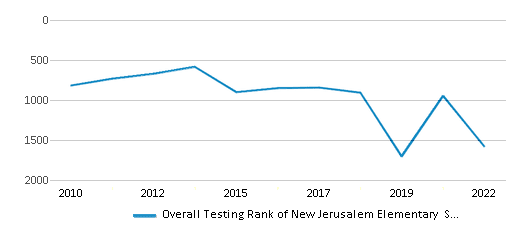
Math Test Scores (% Proficient)
14%
33%
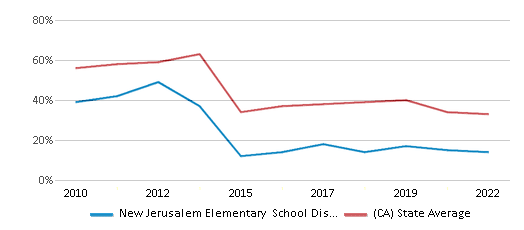
Reading/Language Arts Test Scores (% Proficient)
31%
47%
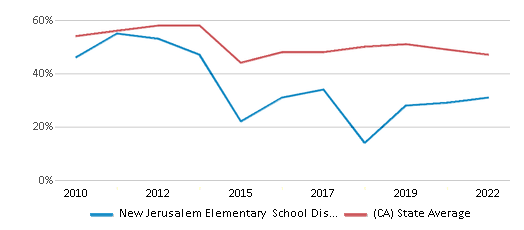
Science Test Scores (% Proficient)
15%
29%
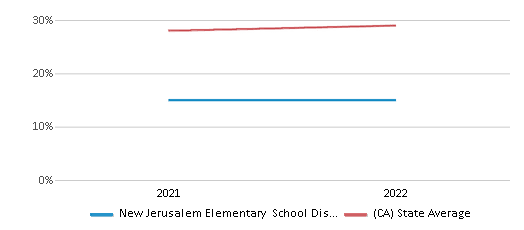
Graduation Rate
77%
87%
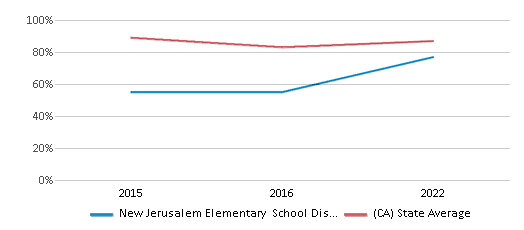
Students by Ethnicity:
Diversity Score
0.62
0.74
# American Indian Students
5 Students
154 Students
% American Indian Students
1%
2%
# Asian Students
91 Students
1,257 Students
% Asian Students
5%
7%
# Hispanic Students
1,063 Students
8,807 Students
% Hispanic Students
56%
44%
# Black Students
98 Students
2,351 Students
% Black Students
5%
12%
# White Students
476 Students
4,154 Students
% White Students
25%
21%
# Hawaiian Students
16 Students
171 Students
% Hawaiian Students
1%
2%
# Two or more races Students
135 Students
643 Students
% of Two or more races Students
7%
4%
Students by Grade:
# Students in PK Grade:
-
18
# Students in K Grade:
133
4,410
# Students in 1st Grade:
115
1,274
# Students in 2nd Grade:
152
1,228
# Students in 3rd Grade:
131
1,320
# Students in 4th Grade:
119
1,316
# Students in 5th Grade:
134
1,281
# Students in 6th Grade:
141
1,267
# Students in 7th Grade:
141
1,363
# Students in 8th Grade:
160
1,444
# Students in 9th Grade:
106
1,363
# Students in 10th Grade:
120
1,386
# Students in 11th Grade:
183
1,328
# Students in 12th Grade:
255
1,117
# Ungraded Students:
-
-
District Revenue and Spending
The revenue/student of $15,514 in this school district is less than the state median of $19,974. The school district revenue/student has grown by 5% over four school years.
The school district's spending/student of $15,095 is less than the state median of $18,396. The school district spending/student has grown by 5% over four school years.
Total Revenue
$29 MM
$116,387 MM
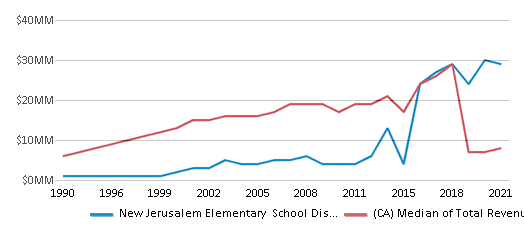
Spending
$29 MM
$107,188 MM
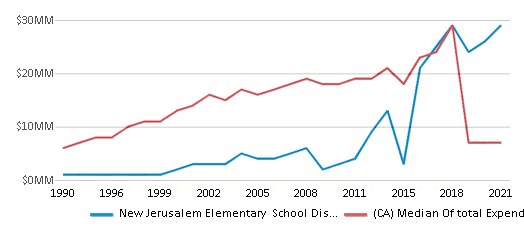
Revenue / Student
$15,514
$19,974
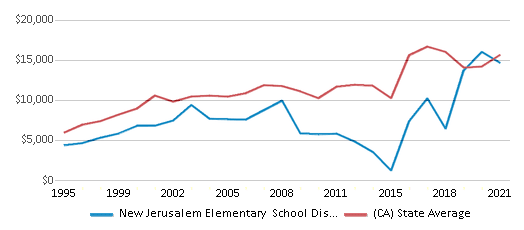
Spending / Student
$15,095
$18,396
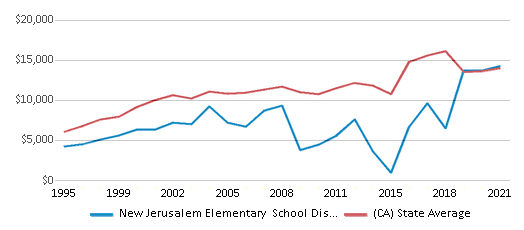
Best New Jerusalem Elementary School District Public Preschools (2025)
School
(Math and Reading Proficiency)
(Math and Reading Proficiency)
Location
Grades
Students
Rank: n/an/a
31400 South Koster Rd.
Tracy, CA 95304
(209) 835-2597
Tracy, CA 95304
(209) 835-2597
Grades: K
| 15 students
Recent Articles

What Is A Charter School?
Explore the world of charter schools in this comprehensive guide. Learn about their history, how they operate, and the pros and cons of this educational innovation. Discover key facts about charter schools, including admission policies, demographics, and funding, as well as what to look for when considering a charter school for your child.

10 Reasons Why High School Sports Benefit Students
Discover the 10 compelling reasons why high school sports are beneficial for students. This comprehensive article explores how athletics enhance academic performance, foster personal growth, and develop crucial life skills. From improved fitness and time management to leadership development and community representation, learn why participating in high school sports can be a game-changer for students' overall success and well-being.

February 05, 2025
Understanding the U.S. Department of Education: Structure, Impact, and EvolutionWe explore how the Department of Education shapes American education, from its cabinet-level leadership to its impact on millions of students, written for general audiences seeking clarity on this vital institution.





